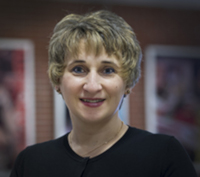Contatto di riferimento: Prof. Gianni Pasolini
Recapito telefonico per contatti: + 39 051 2093553
About the speaker
Octavia A. Dobre is a Professor and Research Chair at Memorial University, Canada. Previously, she was with the Polytechnic Institute of Bucharest and New Jersey Institute of Technology, USA. She was a Visiting Professor with Massachusetts Institute of Technology, USA and Université de Bretagne Occidentale, France, as well as a Chair of Excellence at Universidad Carlos III of Madrid, Spain. Dr. Dobre was a Royal Society Scholar and a Fulbright Scholar. Her research interests include technologies for 5G and beyond wireless, blind signal identification and parameter estimation techniques, resource allocation, as well as optical and underwater communications.
Dr. Dobre serves as the Editor-in-Chief of the IEEE Communications Letters, and was an Editor of numerous prestigious journals. She has served as General Chair, Tutorial Co-Chair, and Technical Co-Chair at various conferences. She is a member-at-large of the Board of Governors of the IEEE Communications Society, and a Fellow of the Engineering Institute of Canada.
Abstract
With the 3GPP Release 15 on the standalone 5G New Radio out in 2018 and with Release 16 coming out this year, 5G is already a reality. While continuing to address the ever increasing demand for high data rates, ubiquitous connectivity and mobility provisioning, 5G and beyond wireless also aims to accommodate a massive number of devices with various traffic characteristics. Massive connectivity and ultra-reliable low-latency communications represent new features, which bring up major changes in the wireless ecosystem. To satisfy the wide requirements in terms of capacity per area, peak and user experienced data rate, spectral and energy efficiency, mobility, connection density, reliability and latency, innovative technologies have been explored by both industry and academia in recent years.
This talk will provide an overview of 5G networks, emphasizing on the use cases, standardization timeline, and enabling technologies. Advantages and challenges of adopting different technologies, such as non-orthogonal multiple access, will be underlined. Machine- type communications will be discussed as an important driving force of future wireless networks, which allows the expansion of the wireless ecosystem to other industries like healthcare and transportation. Finally, in an attempt to answer the question "Quo vadimus," research directions are highlighted for the dynamic and exciting field of future wireless communications.
